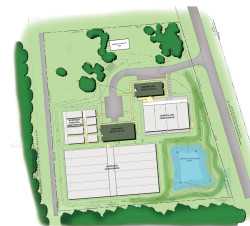Florida Building A Future For Its Citrus

Brace yourself for a quick review of Florida Department of Agriculture and Consumer Services (FDACS) nomenclature and acronyms. Though familiar to most, it’s worth a quick review. If you can stay awake through the next paragraph, you’re home free.
As a regulatory agency of FDACS, Division of Plant Industry (DPI) works to detect, intercept, and control plant pests that threaten Florida’s native and commercially grown plants and agricultural resources. The Bureau of Entomology, Nematology, and Plant Pathology (ENPP) is one of five DPI bureaus. Housed under ENPP is the Citrus Germplasm Introduction Program (CGIP). CGIP is vital to the health and well-being of Florida’s citrus industry and is particularly relevant to our citrus nurseries. CGIP’s purpose is to provide the Florida citrus industry with new citrus germplasm that is free of any known graft-transmissible citrus pathogens. All citrus introductions originating from beyond Florida’s borders must come in through CGIP and undergo a regimen of tests and therapies to assure that we don’t add to our already impressive list of pests and diseases.
CGIP laboratories and greenhouses are presently located on the DPI campus in Gainesville. Demand for varietal commercial and research-based introductions has increased in recent years. This is partly due to enhanced disease research, accelerated variety development, and variety commercialization efforts. Scientists need to expand their access to genetically diverse citrus varieties and citrus relatives to seek solutions to complex challenges. Breeders need new parents with high value traits for variety development. Nurseries, packers, and processors need new commercial varieties to meet the demands of the marketplace. All of this new plant material must transit through CGIP. It was clear that CGIP would need greater resources, and DPI’s leadership was listening. Efforts were made to assess industry needs and prepare a solution.
Construction Zone
Fast forward to present. DPI has secured a site in La Crosse (population 286) to build a new CGIP facility. La Crosse is approximately 15 miles north of Gainesville in Alachua County and is roughly 100 miles from the northern tier of Florida’s commercial citrus producing area. Plans have been finalized and a bid package released to construct new greenhouses, laboratories, and offices. Dirt will begin to turn late summer 2012, and the CGIP program will move to La Crosse inside a year’s time. The new facilities will double — perhaps triple — DPI’s capacity for processing imported citrus plant material. Coupled with innovative process flows and employee training, CGIP will be well positioned to meet industry needs. Due the availability of Farm Bill funding, the La Crosse facilities will feature new laboratory equipment and molecular testing devices that will further enhance CGIP’s capabilities. All employees are moving to the new facility.
Superior Structure
In addition to enhanced capacity for testing and treatment of imported material, the new La Crosse greenhouse space will provide important redundancy for the Bureau of Citrus Budwood Registration. The La Crosse greenhouses will have enough space to house certified trees of our most important commercial varieties housed in DPI greenhouses in Chiefland. In the event either structure were damaged or compromised, a redundant supply of budwood for our most precious varieties would be invaluable.
Many nurseries have asked whether DPI will eventually consolidate its laboratories and testing programs. Though DPI’s Bureau of Budwood Registration laboratories are currently housed in Winter Haven, there is no immediate plan to combine this program with CGIP. This has been discussed in longer-term planning, but such a change is not imminent.
Look for more information and updates as construction progresses. This is welcome news indeed, and strong evidence of FDACS responding to the changing needs of industry.










